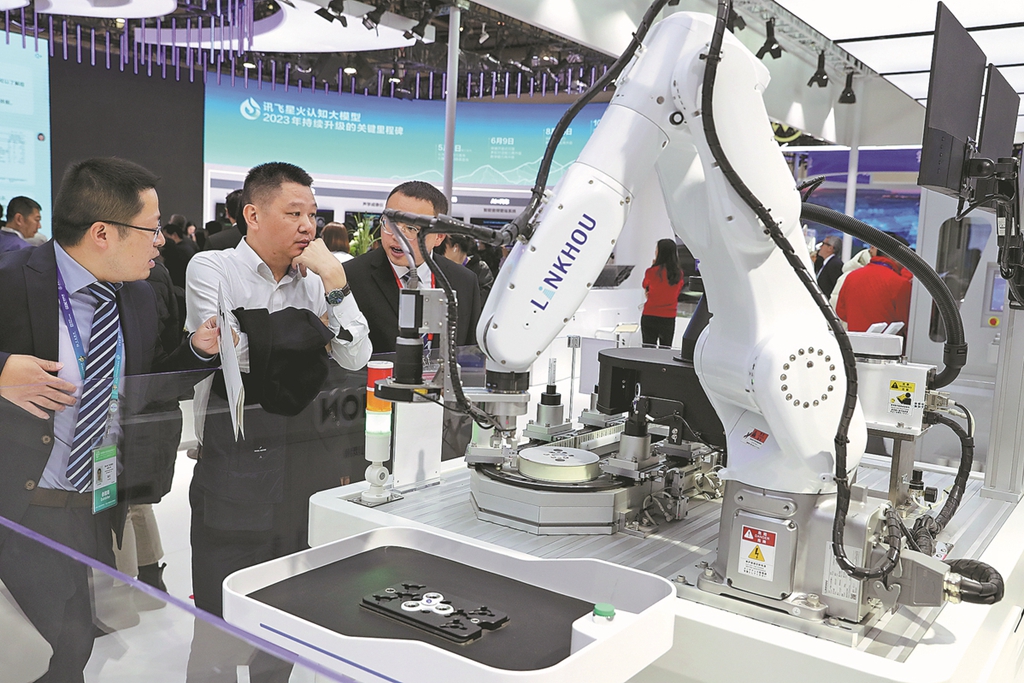Supply chain resilience vital, premier tells expo

Visitors check a Linkhou multifunctional visual inspection platform on display at the China International Supply Chain Expo in Beijing on Tuesday. The machine provides an industrial camera to perform recognition, measurement and positioning tasks. WANG JING/CHINA DAILY
China is willing to work with other countries to build a global industrial and supply chain system that is secure, stable, smooth, efficient, open, inclusive and mutually beneficial, Premier Li Qiang said on Tuesday.
Addressing the opening ceremony of the first China International Supply Chain Expo in Beijing, Li said that maintaining the resilience and stability of global industrial and supply chains is a vital guarantee for promoting the development of the world economy.
Highlighting that China will unswervingly ensure that industrial and supply chains are public goods, Li said the country will continue to provide high-quality Made in China products to the world.
The nation will continue to promote high-quality cooperation via the Belt and Road Initiative, and will strengthen cooperation in intelligent manufacturing and digital economy to boost the quality and efficiency of global industrial and supply chains, Li added.
Ngozi Okonjo-Iweala, director-general of the World Trade Organization, said in a speech via video link that "the inaugural supply chain expo is the right event at the right time", as the shocks of the COVID-19 pandemic and the supply disruptions that followed exposed general vulnerabilities in the way global production networks are organized.
According to Okonjo-Iweala, there is some reshoring or near-shoring in some sectors, especially in the name of national security.
"But if countries let it go down the road of large-scale reshoring, it would just be giving up the productivity gains that come with specialization, scale and trade. There would be an increase in supply concentration. And that would make supplies less resilient," she said.
There's a better way forward to achieving resilience, and that is to deepen and diversify supply chains by extending them to encompass developing regions of Africa, Latin America and parts of Asia that have the appropriate business and investment environment, but have been left on the margins of the global division, she added.
John Denton, secretary general of the International Chamber of Commerce, said that trade is a powerful driver of economic growth, but "in recent years, we see the resurgence in trade-restricting measures across certain parts of the world".
"With trade, frictions and geopolitical tensions on the rise, the strategic and operational importance of the rules-based multilateral trading system cannot be understated," Denton said.
The International Monetary Fund estimated that the cost to global output from economic decoupling could be up to 7 percent of world GDP.
"This is not an insignificant cost. The constant fragmentation and erosion of the world trading system, we must stop it. There is no alternative to the rules-based multilateral trading system, which stands as a necessity," Denton said.
As the world's largest manufacturing country, China has the most complete industrial system in the world, and its manufacturing output accounted for nearly 30 percent of the global total in 2022, according to the Ministry of Industry and Information Technology.
Denis Depoux, global managing director of consultancy Roland Berger, said that, thanks to China's improved productivity, broad industrial clusters and well-established infrastructure, it will remain the factory of the world.
Isabel Ge Mahe, vice-president and managing director of Apple Greater China, who also attended the supply chain expo, said, "Chinese suppliers have grown very fast and become an indispensable and particularly important part of our supply chain over the past 30 years."
Now, 151 of Apple's 200 major suppliers, including foreign and Chinese suppliers, have a production presence in China.
"Chinese suppliers are world-leading in their technologies," she said, adding that Apple is very happy and willing to help China's transition to intelligent manufacturing.
Zhou Qunfei, founder of Chinese glass and touch screen maker Lens Technology, said that "smart manufacturing and automation can help us boost efficiency and improve the qualified rate of products. It is a must-choose road for us."
According to Zhou, the company aims to invest more to boost the automation level of its assembly lines in the future.








